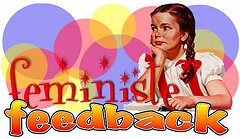
A reader writes in:
I’m writing to ask a question about women’s health in general. My mum, who is not very political (politicised?) just got elected to her town board. I’m not sure what that means, politically (a small town in Australia, dominated by the defense industry). She said she might choose the women’s health platform.
Being the feminist that I am, I immediately shot back with ‘great idea! Here are some key areas:…’ and then kind of ran out of steam. I’m not a very good feminist. This is the list as I have it:
– reproductive health – access to contraception, abortion clinics, sex
education, ..
– maternity leave
– ..
Yeah. I can think of a bunch of other issues that are important, but I’m not sure how to summarise a few key areas in women’s health. I don’t know how my fairly conservative (on some issues, not on others) apolitical mum will take the list, but that’s cool. If you were offering advice to a woman in a similar position, what would you say? How would you frame women’s health issues on a general platform?
I don’t know what actual powers/responsibilities her position entails, I imagine fairly smallscale, but I guess this puts her in a position to at least publicly discuss these things. Any help would be appreciated 🙂
Leave your suggestions in the comments.
You can write into Feministe Feedback by emailing feministe@gmail.com